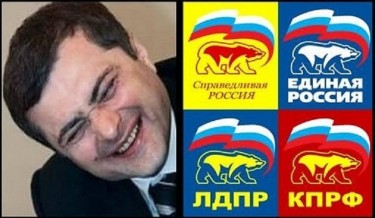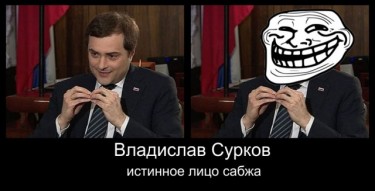RuNet Echo recently reviewed a London talk given by Vladislav Surkov, Russia's grey cardinal, the inventor of NASHI and “sovereign democracy,” wherein he claimed that the Kremlin has defeated the opposition. A few days later, Surkov was harshly criticized for some of his statements by Russia's Investigative Committee spokesman, Gen. Markov, in an Izvestiya article. This week, Surkov was dismissed [ru] from his post of Deputy Prime Minister and head of the ministerial apparatus. Failure to carry out Putin's electoral promises was cited as the official reason.
While it is commonly assumed that Surkov fell from grace a year earlier, when he was replaced as the powerful Deputy Head of the Presidential Administration by Vyacheslav Volodin, and given a post many viewed as a demotion, he was also thought to still be immune to political travails. And so, the RuNet reacted to his resignation with equal parts of disbelief, glee and worry.

As illustrated by this meme, Surkov is often credited with creating Russia's current party system — a set of false alternatives to United Russia. Anonymous image widely distributed online.
The glee is easy to explain — to the opposition Surkov is the architect of Russia's repressive political system, in short, a villain. Other Russia's Eduard Limonov was particularly ecstatic [ru]:
Нацболы радуются падению этого типа, поскольку с 2005 года он возглавлял гонения на нас (возможно и раньше,но в феврале 2005-го он создал организацию “Наши”, основной целью которой определил борьбу против Национал-Большевистской партии). […] то что наш заклятый враг в настоящее время лишился власти, – отлично. […] Сегодня мы выпьем за его уход. Гип-гип-ура!
The natzbols are happy for the fall of this guy, since he has headed our persecution from 2005 on (maybe even earlier, but in February of 2005 he created the NASHI organization, the main purpose of which he made the struggle against the National Bolshevik party). […] the fact that our sworn enemy is currently out of power, is great. […] Today we drink to his leaving. Hip hip hooray!
But then, why the worry? As Afisha's editor-in-chief Ilya Krasilshchik quipped [ru]:
вот и дожили до момента, когда увольнение суркова воспринимается как что-то плохое.
and so we've lived to see the moment when Surkov's firing is construed as something bad.
The reasons for this are a bit more complex. Many of those indulging in kremlinology assume that Surkov was fired after pressure from the Investigative Committee, a worrisome idea because it would mean that the siloviki are currently winning their battle against the “liberals” in the government (roughly speaking Prime Minister Dmitry Medvedev and his allies, who Surkov has supposedly joined). For Pavel Pryanikov, of ttolk.ru, the situation is reminiscent [ru] of the role the security apparatus had in the Soviet Union:
[…] Следственный Комитет сегодня – это аналог НКВД 1936 года, суперведомство с суперполномочиями. Ну и скорее всего теперь следует ожидать окончательной зачистки во власти сислибов […]
[…] the Investigative Committee today is analogous to the 1936-era NKVD, a super-institution with super-powers. And, more likely than not, we should expect a final purge of syslibs [system liberals] from power […]
If true, this is especially troubling news for Alexey Navalny, who has recently been incessantly harrying Investigative Committee head Gen. Bastrykin for the past year. Maksim Kononenko, a Kremlin supporter and a big fan of Surkov, was despondent [ru] for similar reasons:
Версия о том что теперь Маркины главные, конечно, наиболее вероятно, но лично мне о ней вообще не хочется думать.
The theory that now the “Markins” are in charge, is, of course, the most probable one, but personally I don't even want to think about it.
Instead, as a long shot, Kononenko is hoping that dismissals are simply one way for Putin to distance his most trusted allies from Medvedev's government, because he is planning to dissolve it some time soon. Kononenko's one-time boss, Marat Gelman (currently a modern-art promoter and gallery owner, Gelman used to be a political spin-doctor), was less optimistic [ru], thinking that the attack on Surkov signals a shift in the ruling paradigm:
Бояться должны все. Сначала вычистят сурковскую клиентелу, потом Медведевскую, потом Сечинскую.
Everyone should be afraid. First they'll purge Surkov's clientele, then Medvedev's, then [current RosNeft chairman] Sechin's.

Surkov's troll-face is his true face. Anonymous image widely distributed online.
DemVybor's Kirill Shulika agreed [ru], referring to Surkov's style of “governance through deception”:
Раньше были разводки, теперь они заменены уголовными делами и тюремными сроками. Сурков, как бы к нему ни относиться, во-первых, политический эстет, который не будет бить горшки молотком
Before there was trickery, now it has been replaced with criminal charges and prison sentences. Surkov, whatever you may think of him, is, first of all, a political aesthete, who won't break pots with a hammer
Boris Nemtsov had a similar idea, saying [ru] that Surkov's light propaganda touch is not needed any longer:
ПУТИН взял курс на репрессии и посадки. Сурков ему в этом деле помочь не может. Бастрыкина достаточно.
PUTIN has taken a course for repressions and prisons. Surkov can't help him with this. Bastrykin is enough.
The nationalist publication Sputnik&Pogrom took an all too familiar tack with its borderline racism when commenting on the story, but ended up making the same basic point [ru]:
[…] противостояние русского европейского образованного класса и советской азиатской рабоче-крестьянской власти более невозможно маскировать томными чеченоевреями, пишущими романы и рассуждающими про «дискурс», пытающимися примирить белых европейцев и советских монголов.
[…] the conflict between Russian-European-educated classes and the Soviet-Asian-worker-peasant government can no longer be masked with languid Checheen-Jews [Surkov is half-Chechen on his father side], who write novels and talk “discourse”, and try to reconcile white Europeans and Soviet Mongols.
Others are worried for a different reason. Surkov's political acumen is of such mythical proportions, that people have trouble believing his dismissal isn't simply the latest in a long series of grifts. The poet Igor Karaulov, for example, joked [ru] that Surkov will be sent to subvert the protest movement from the inside:
Через месяц на Болотной. Навальный (громко, призывно): “Кто мы”? Публика, хором: “Мы – сурковская пропаганда!”
In a month, on Bolotnaya Square. Navalny (loudly, invitingly): “Who are we?” The Public, all together: “We are surkovian propaganda!” [a play on the phrase “you are surkovian propaganda” used by opposition members, sometimes ironically, to label government supporters]
For some, there is a seed of truth in the joke. Alexander Artemyev, a journalist, tweeted [ru] that Surkov will soon be standing in the opposition ranks, along with another former Kremlin stalwart Gleb Pavlovsky, who became a fixture at anti-government events over the last year. Olga Romanova tweeted [ru] the same prediction. In a bit of a twist on this meme Yevgeny Levkovich, another journalist and opposition activist, darkly hinted [ru] at a new Kremlin project to create an American style two-party system, and thought that Surkov is perhaps being moved to this project.
We may never know the real reasons for Surkov's leaving, but the story is in all likelihood rather mundane. Which is why the theory [ru] put forth by Kirill Shulika on his blog is particularly attractive: Surkov simply did not like his job, which, unlike his creative policy-based position at the President's Administration, saddled him with heaps of bureaucratic work and late hours:
Получилось так, что в Кремле его сожрал Володин, а на должности, которую ему дали в качестве компенсации, он просто себя не нашел.
So it turned out that at the Kremlin he was consumed by Volodin, but at the position assigned to him in compensation [for the old one], he simply couldn't find himself.
Or perhaps the reason is even more simple, suggests Stanislav Yakovlev:
Почему ушел Сурков? Да заебали вы его.
Why did Surkov leave? He's just f*cking tired of your sh*t.







